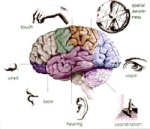5 Actions to help someone who has lost touch with reality
 When someone has lost touch with reality the words to describe this experience, “psychosis” and “psychotic” often scares people. One automatic response to those words that many people have is “crazy”.
When someone has lost touch with reality the words to describe this experience, “psychosis” and “psychotic” often scares people. One automatic response to those words that many people have is “crazy”.
Reality is simply created by people agreeing on shared sensory experiences.
Psychosis simply refers to someone experiencing things with their five senses that other people are not able to perceive.
The five senses:
- Sight
Some people see people or things that others do not see.
Some people see sounds or smells represented by shapes and colors.
- Sound
Some people hear sounds or voices that others do not hear.
Some people feel sounds with their body or taste sounds that other people cannot.
- Touch
Some people feel sensations in or on their body that other people cannot feel.
Some people can touch something that others do not perceive.
- Taste
Some people taste flavors and textures that others do not taste.
- Smell
Some people smell pleasing and displeasing scents that others do not smell.
What most people do not understand is that the EXPERIENCE of these sensations is very real.
When other people do not agree or share in these sensory experiences it does not make it any less real for the person who does.
 These sensory experiences are taking place in a person’s brain.
These sensory experiences are taking place in a person’s brain.
What MAY be happening during these sensory experiences is:
- There could be a communication problem in the sensory centers of the brain
- Communication error between the sensory centers of the brain and the cerebral cortex (thinking part of the brain).
- The messages coming from the five senses may get jumbled by the time they reach the sensory centers.
When someone is having these experiences, the goal is not to “snap them out of it”.
Instead, goals are to help loved one’s by:
- assessing their safety in regards to harm to self and/or others.
- meeting and supporting them wherever they are in their experience
- helping them regulate if they are willing.
Five actions you can take to help someone who has lost touch with reality.
1. Do not challenge or try to disprove their experience
Instead, BE CURIOUS.
Some ways of being curious:
- Ask them to tell you what they are hearing or seeing etc.
- Ask how it affects them – behavior, thoughts, feelings etc
- Ask how they feel about it
- Ask them if they believe it is a problem or if there are ever times when it is problematic.
- Ask them how it helps them.
This assesses for safety and prevents agitation.
If what they are experiencing is causing them to want to do harm to themselves or others, hospitalization is necessary immediately.
It is not helpful to tell someone who is experiencing psychosis that what they are experiencing is not happening. Doing so often causes agitation for the person and isolation.
2. Bring their attention to their body
There are several activities you can do to help someone bring their attention into their body. However, when someone is experiencing psychosis, you do not want those activities to be based on imagination. The activities should be physically based:
- Breathing: have them notice their lungs filling. Some people may not respond well to listening to their heart beating it could cause some to become agitated.
- Wiggle the toes, rotate the ankles, raise and lower the legs, or massage their own legs. You can do the same with fingers, wrists, and arms.
- Put feet flat on the floor, sit with good posture and breathe
- Rotate neck clockwise and counterclockwise. This can be done with the chest as well.
What these activities do is engage the sensory organs and sensory centers in the brain to the present moment in the body. This may help someone regulate their brain by focusing on the physical senses.
3. Focus on breathing
Breathing is consistently important in everything we do.
Ask them to take at least seven deep breaths, into their belly, and slowly release them.
Breathing deeply helps regulate the brain. Its like pressing the restart button.
4. Redirect them to thinking about a time & place where they felt good
If they are agitated, ask them to tell you about a time and place where they felt good (or whatever emotional state they are needing).
Ask them about sensory things like what they saw, heard, touched, tasted, smelled etc. This may help regulate the sensory areas of the brain.
5. Containment
If your loved one is a willing participant to be close to you, ask them if you may hug them. Ask them if you may give them a long tight hug.
This type of hug is not one in which you pat them on their back or rub their back. This type of hug is one in which you hold them tightly, without squeezing, and simply breathe deeply together.
This form of containment and breathing is very calming and may also be a “reboot button” for the brain.


Hello:
I have a 27 year old son who was diagnosed at age 15 with ADD (primarily inattentive type) by a school psychologist. She told us that we basically did not need to do anything. We did not want him put on medication so we worked with him on how to cope with his impulsiveness and sometime hyperactivity. Overall he seemed a little hyper and distracted through the remainder of his teenage years but no issues. He moved out of the house across the country (us in PA, he in OR) at the age of 21 and is living with a friend. He has had recent bouts with depression in the last 2 years and was initially given Lexapro 10mg to treat by his GP. Within the last 2 months he had told me that the medication was not helping and he was in “emotional pain.” He suggested to his GP to switch him to Wellbutrin about 3 weeks ago. I was not sure of his dosage but since then he apparently developed a manic state due to an adverse reaction to the medication. His friend that he lives with had to have him admitted to a hospital recently since he was having hallucinations and talking about conspiracies. He was discharged to home after only 2 days admission in a somewhat lucid state but still is manic. I have been talking to him on the phone. He is aware of his episode and he has been coping through it. Once we stabilize the conversation on something we both know of he is fine. He is on no meds at this time. They are following up with him at the hospital next Monday with his meds (by an RNP) and then psychotherapy next Tuesday with a doctor.
What is the best thing we can do right now? His friend is helping him and taking care of him but he appears to be somewhat in control of himself as he is totally aware of what is going on. Could this be due to the Wellbutrin bringing this on as an adverse reaction? Any help would be welcome as we come to grips with this as parents far away. Thanks.
Hi Bob,
I have so much compassion for what you are experiencing. I know it must be so hard to be so far away.
If he has a friend who was willing to get him help and get hospitalized and be their for him…in my opinion, he is in good hands.
Only a Psychiatrist, after observing him and monitoring him, can diagnose his behavior and reaction.
All any parent can do in this kind of situation is to let their child know how much they care, support and love them. And if their child is not able to advocate for the best possible treatment, the child can sign a release so that the parent may advocate for their child with doctors and medical professionals.
I hope this is useful.
Robin
Hi Robin,
I have a friend. He has been meditating a lot but at the same time, he is going through a lot. He doesn’t have any money and so he doesn’t eat much and he hasn’t been sleeping. Today was the first time I’ve seen him in 5 days and within that time, something in him snapped. He thinks he can cure his aunt’s cancer by meditating with her and “transferring” his energy to her to do so. He invited me to meditate with him and as his friend I wanted to support his ideas. He keeps saying that he lives in his own reality. He walks barefoot everywhere… keeps saying we are all one consciousness and that he can help everyone because that is his destiny. He also keeps saying that everything is a test and that we need to pass. But he also is saying that, “you need to help me get back to your world and reality” “ive lost touch with reality” … theres so much more to it but I am so out of words about the situation. If you’d like to assess him, please message me and I can give you his name and you can add him on fb and just look at his wall posts… Please… help.
Jack